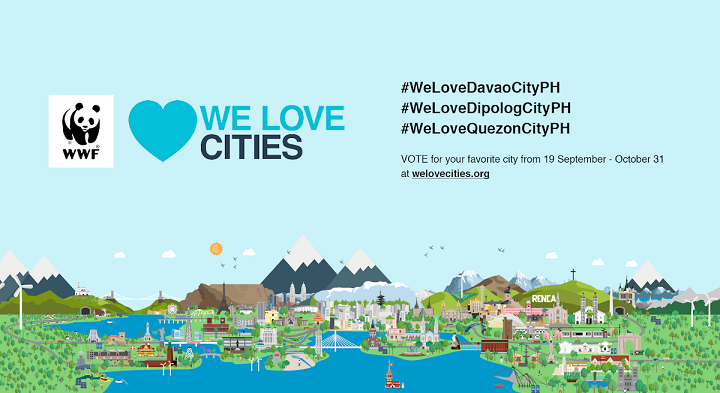
Davao City, Dipolog City, and Quezon City are representing the Philippines in this year’s leg of the World Wide Fund for Nature (WWF)’s We Love Cities Campaign (WLC)—the organization’s global campaign that supports the creation and development of cities that enable all people to thrive and prosper while respecting the ecological limits of our one and only planet.
Linked with the One Planet City Challenge (OPCC), which guides cities globally to reach their climate mitigation and adaptation plans, WLC aims to raise awareness and inspire citizens to support the sustainable urban development initiatives of their respective cities. The country’s WLC 2022 representatives have also emerged as the national finalists for the OPCC 2022.
Qualifying Davao City in this year’s campaign is its outsized goal for emissions reductions, targeting a 75% reduction by 2030 from a 2017 baseline. Helping the Philippines’ second-largest city by land area and third largest by population size achieve its climate mitigation target are the fifty-four-kilometer cycle lanes that encourage Davao residents to be active on their bikes and reduce their carbon footprint, as well as the ongoing installation of solar street lights, making brighter, safer Davao streets. The city has also launched several initiatives that promote sustainable food production and improved farming practices, including the efforts of local farms to go organic.
On the other hand, Dipolog City plans to cut greenhouse gas emissions by 2050 and will undertake a 100% emissions reduction compared to its 2018 baseline. As such, the mid-sized city on the northwestern island of Mindanao will convert three-quarters of city street lights to solar to reduce emissions and generate positive savings for the city. The city will also undertake a large forest restoration project covering an area of 589 hectares in the mountain ranges of Barangays Dicayas and Lugdungan, where a variety of flora and fauna, including the endangered Mindanao tarsier, thrive. This project will also increase biodiversity in the area to eventually sequester 4,000 tonnes of CO2 equivalent annually and counter deforestation in the city’s surrounding zone.
As the sole Luzon island representative for this year’s roster of flagbearers, Quezon City is ramping up its sustainable energy initiatives to meet its goal of reducing emissions by 30% in 2030 compared to business-as-usual projections while also committing to reduce 80% emissions, leading to net-zero by 2050. The city is also set to shift to a more sustainable energy source, with solar PV installations set to be installed in city-owned hospitals and schools and eventually, in all viable city buildings and facilities in the next eight years. The City of Stars also doubled its bike lanes to 93 kilometers by the end of 2020, which has earned recognition for its foresight in creating protected bike lanes for cyclists. In addition, the city launched an innovative program that allows citizens to switch to a more sustainable lifestyle by trading their recyclables and single-use plastics for environmental points to buy necessities and pay utility bills.
Atty. Angela Ibay, WWF-Philippines’ Climate and Energy Program Head, expressed her appreciation for the country’s local qualifiers this year as they participate in this campaign to promote sustainable urban development. “As local governments continue addressing the effects of the pandemic, we would like to commend Davao City, Dipolog City, Quezon City, and the other LGUs who have taken part in this call to achieve climate mitigation and enhance their cities’ resiliency. We hope that our WLC finalists’ efforts in finding solutions to ensure that development is made sustainable by putting into the equation the environment and people inspire others and empower them to take collective action. With the pandemic proving the link between planetary and human health, it is important now, more than ever, that cities and citizens do their part to #ChangeTheEnding for the planet.”
With cities accounting for 70% of carbon emissions worldwide and playing a pivotal role in generating the global GDP, they are encouraged to share climate mitigation and adaptation plans, taking into consideration their influence and power to transition towards a climate-friendly, one–planet future—a challenge responded to by this year’s Philippine representatives.
This year’s WLC will run from September 19 to October 31. The city that will receive the most number of website votes, social media posts, and suggestion submissions by the end of the campaign period will be declared the We Love Cities 2022 global campaign winner.
Campaign for your favorite Philippine city on your social media platforms by using the hashtags #WeLoveDavaoCityPH, #WeLoveDipologCityPH, or #WeLoveQuezonCityPH.

